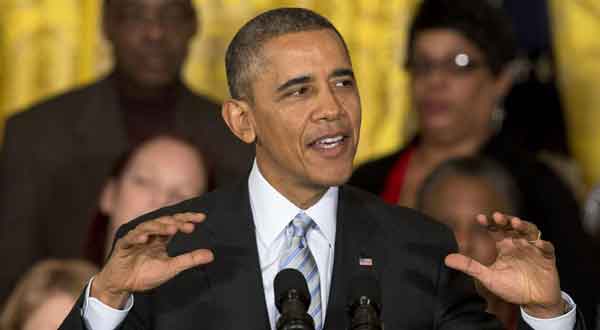当前位置: Language Tips> 双语新闻
Obama to tour Japan, S. Korea, Malaysia, Philippines in April

|
Obama's visits to Manila and Kuala Lumpur are intended to make up for his no-show when he cancelled a previous Asia tour in October amid domestic political strife in Washington. A subtext to his visit will be rising territorial tensions between several US allies and China, which deepened over Beijing's recent declaration of an "air defense identification zone" in the East China Sea. Beijing was also angered last week when Washington stiffened its line on territorial disputes in the South China Sea, calling for adjusting or clarifying its claims. Obama's stops in Japan and South Korea will also bolster close US alliances, at a time of aggravated political tensions between its two Northeast Asian friends. It was an open secret that Obama would visit Japan in April, to take up an invitation from Prime Minister Shinzo Abe, who took office in December 2012. But the decision to add South Korea to the trip came after rising pressure from Seoul and from the Asia policy community in Washington. The move also reflects a desire to signal to North Korean leader Kim Jong-Un that there are no gaps in US and South Korean resolve to counter Pyongyang's nuclear program and provocations. It indicates that Obama is keen to avoid dealing a political slight to South Korean President Park Geun-Hye that could have occurred if he visited Tokyo and not Seoul. Relations between the two nations were rattled by Abe's December visit to the Yasukuni Shrine, which honors war criminals among Japan's war dead. Obama's Asia itinerary also includes one noticeable exception -- a stop in China. But he is expected to return to the region later in the year for regional summits in Australia, Beijing and Myanmar. - 'Ongoing commitment' - The White House said in a statement that Obama's April trip will highlight his "ongoing commitment to increase US diplomatic, economic and security engagement with countries in the Asia-Pacific region." He will try to push negotiations on a vast Trans-Pacific Partnership free trade pact that would include 12 nations, and is seen by some observers as an attempt to meet the economic challenge of a rising China. The president, however, may encounter some skepticism from regional partners because Senate Democratic Majority Leader Harry Reid, a key Obama ally, has expressed skepticism about granting him expanded powers to negotiate trade deals. In light of Reid's remarks, Pacific Rim nations will be loath to make concessions in the trade talks, fearing that any deal agreed may be modified by the US Congress. Obama will stop first in Japan, where he will meet Abe. Then he will travel to Seoul for talks with Park, likely to be dominated by North Korea's latest maneuvering on the divided peninsula. Pyongyang is currently fuming at the prospect of annual US-South Korean military exercises starting later this month and that it views as an act of war. From Seoul, Obama will head to Malaysia to meet Prime Minister Najib Razak to discuss deepening defense and military ties. Obama will be the first US president to visit Malaysia since Lyndon Johnson in 1966. The Obama administration has been building on US efforts to cultivate closer ties with the country following the two-decade rule of former prime minister Mahathir Mohamad, who left office in 2003. Obama's final stop will be Manila, where he will meet President Benigno Aquino and discuss evolving military relations designed to include rotations of US troops in the country. The White House did not give exact dates for the trip, other than saying it would take place in late April. Obama is expected to be away for about a week. - America's first 'Pacific president' - Obama has declared he is America's first "Pacific president" and announced a rebalancing of military and strategic resources to the dynamic, fast-growing region. But the cancellation of his trip last year, and the departure from his administration of big hitters committed to the Asia pivot like former secretary of state Hillary Clinton prompted concern in the region over US staying power. Michael Green, who used to coordinate White House East Asia policy for president George W. Bush, said Obama must convince powers in Southeast Asia that his commitment remains firm in his second term -- amid impressions that Secretary of State John Kerry is more interested in the Middle East. "Within Southeast Asia, they don't think that the new team has the same understanding, or commitment to the importance of ASEAN (Association of Southeast Asian Nations)," said Green, now with the Center for Strategic and International Studies.
|
美国白宫2月12日宣布,美国总统奥巴马将于今年4月访问日本、韩国、马来西亚和菲律宾亚洲四国,加强与亚太地区各国间的外交、经济和安全关系。 美国白宫发言人卡尼在宣布奥巴马这一行程时,没有说明为何不访问中国的原因。消息显示,奥巴马可能会在今年夏秋之际单独访问中国。 ***天皇将见奥巴马 奥巴马总统将于4月下旬首先访问日本,与日本首相安倍晋三举行首脑会谈。 奥巴马访问日本的目的是“加强日美同盟、深化包括跨太平洋伙伴关系协定(TPP)在内的经济关系以及扩大在亚洲地区的外交课题相关合作”。日美两国将在年内修改《日美防卫合作指针》,并力争使TPP谈判尽快达成协议。 这将是奥巴马第三次访日,也是其第二任期中的首次,上次访日是在2010年11月。此行旨在消除因安倍参拜靖国神社导致的两国间嫌隙,确认强化日美同盟。日本政府希望借此机会向外界显示日美间的团结。 有关访日的具体日程和是否为日本政府所希望的国事访问,美国政府表示“正在与日本政府协调”。 日本政府关系人士透露,奥巴马将于4月22日、23日两天访问日本。目前正就4月22日至23日的访问日程进行最后协调,还没有确定奥巴马是否会在东京滞留2个晚上。日前访问了华盛顿的日本外务大臣岸田文雄在与克里国务卿举行会谈时,表示:“即使住一个晚上,日本也希望给予奥巴马国宾待遇。”因此,奥巴马4月的日本之行,日本政府将予以国宾待遇,并安排天皇会见。 ***朴槿惠不甘韩国被落下 访问日本后,奥巴马还将访问韩国。韩国原本不在访问目的地之列,朴槿惠政府为避免奥巴马仅访问在历史问题上与韩国存在对立的日本,积极争取到奥巴马访韩。美国官员认为,作为美国盟友,日韩关系紧张不符合任何一方的利益。 奥巴马还将访问马来西亚和菲律宾,力图重整被指有名无实的重视亚洲战略。去年10月由于联邦政府关门,美国总统奥巴马彻底取消原定亚洲之行,缺席当年的亚太经合组织领导人非正式会议以及美国—东盟峰会、东亚峰会。 白宫称,此次亚洲之行是为了“加强与亚太地区各国间的外交、经济和安全层面的关系”。访问日本的目的是“加强日美同盟、深化包括跨太平洋伙伴关系协定(TPP)在内的经济关系以及扩大在亚洲地区的外交课题相关合作”。 2009年,奥巴马在东京发表演说,以“美国历史上首位太平洋总统”自居,宣称美国是太平洋国家,与亚洲命运密不可分,承诺将更多参与亚洲事务,与传统盟国加强合作。但他去年取消亚洲之旅,致力于重返亚太政策的前国务卿希拉里和前防长盖茨纷纷挂冠而去,引发一些亚洲国家对美国实力的质疑。 相关阅读 (欧叶 编辑:信莲)
|
|
|
上一篇 : 埃及出土3600年前木石棺 内藏一具木乃伊
下一篇 : 多部华语电影入围2014年柏林电影节
电话:8610-84883645
传真:8610-84883500
Email: languagetips@chinadaily.com.cn